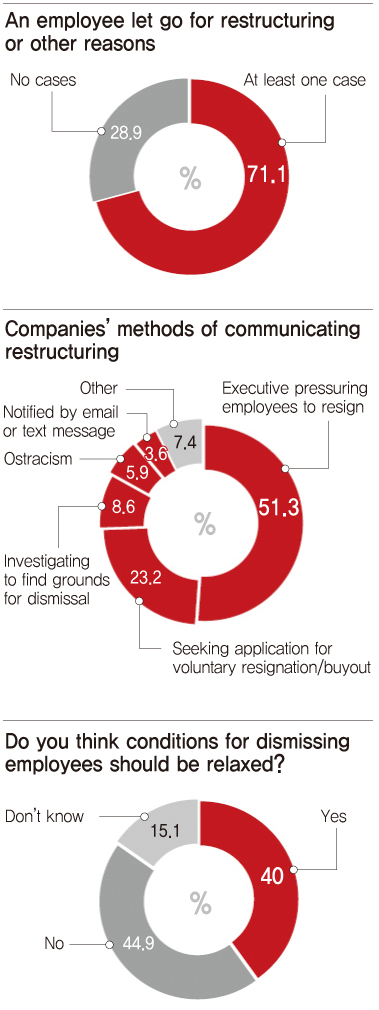Poll: more than half of employees anxious about their situation
Companies using the tactic of pressuring employees to resign instead of going through layoff procedure
A recent poll shows more than half of company employees confessing to feeling anxious about their employment situation.
The job portal site Incruit conducted an online survey of 1,379 working people commissioned by Hankyoreh 21. The results showed 980 respondents (71.1%) indicating that at least one employee had been let go by their company for restructuring or other reasons. In contrast, just 399 (28.9%) said they did not know of any such cases.
When asked whether they had been pressured to leave the company, 701 respondents (50.8%) answered yes. Even when the 1,109 respondents whose full-time positions seemingly guarantee their employment were analyzed separately, a nearly identical 50% (555 respondents) said they had been pressured to resign. In general, the polling results suggested restructuring pressures extend to multiple corporations rather than only the large financial ones.
The most commonly given reason for letting employees go was “poor business conditions and the need to cut personnel costs,” given by 440 respondents (31.9%). Another 338 (24.5%) cited “a bad relationship with the manager(s),” while 167 (12.1%) gave “poor performance.” The answers suggest company employees see employment as more commonly influenced by company or manager needs than performance.
Pressure to resign voluntarily was cited as the most common method of restructuring. Of the 1,043 respondents who had seen a colleague pressured to resign, 535 (51.3%) said an executive had previously summoned the colleague to encourage him or her to resign voluntarily. The next most common method was “demanding an application for voluntary resignation” (23.2%) and “investigating to find grounds for dismissal” (8.6%). “Ostracism” was cited by 5.9% of respondents.
“There has been mention of the conditions for layoffs becoming less stringent, but it‘s difficult for companies to go through the legal procedures to let a worker go, so they often pressure employees to resign voluntarily,” explained labor attorney Yoo Da-yeong.
“An employee can succeed by holding out against the pressure to resign, but it’s not easy, because companies can do things to hurt their self-esteem, such as taking away positions or preventing them from using computers,” Yoo said.
Indeed, just 14.7% of respondents to the poll said they had successfully held out against pressures to resign voluntarily.
Jeong Hyun-cheol, who heads the Korean Finance & Service Workers’ Union organization department for the Korean Confederation of Trade Unions, advised employees to state their positions clearly and record any meetings with managers pressuring them to resign voluntarily.
“In many cases, [companies] respond to refusals to agree to resignation by saying they will change an employee’s duties or sent them on remote assignments,” Jeong explained.
“If they do give prejudicial treatment in terms of working conditions, [employees] can apply for relief through the National Labor Relations Commission,” he added.
During a policy debate on preventing indiscriminate restructuring and establishing legislative measures for employment security, Ewha Womans University law professor Do Jae-hyung stressed the need for legislation to regulate indirect employment adjustment.
“In terms of realistic methods to regulate remote deployments and waiting list assignments as means of pressuring employees to resign, we can establish a legislative definition of which cases can be treated as ‘constructive dismissals’ [ostensibly consensual contract terminations that can be regarded as dismissals in fact] and apply legal measures to restrict such terminations,” Do said.
By Lee Wan, Hankyoreh 21 staff reporter
Please direct questions or comments to [english@hani.co.kr]
http://h21.hani.co.kr/arti/cover/cover_general/38650.html




No comments:
Post a Comment